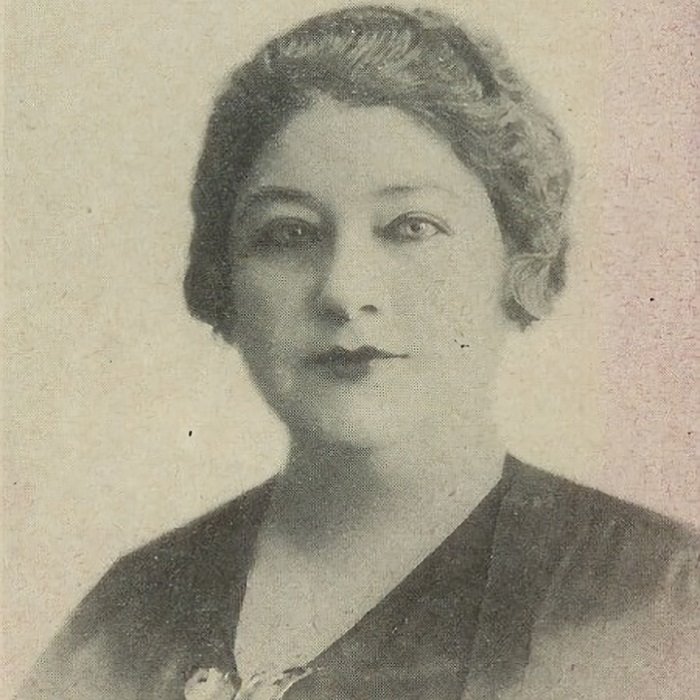Members
1 Female
Origin
 Marseille
Marseille
Genre
---
Style
---
Mood
---
Born
1 Female
Origin
Genre
---
Style
---
Mood
---
Born
1885
Active 1908 to
![]() 1941
1941
Cutout![]()
No loved tracks found...
Artist Biography
Available in:
Berthe Sylva, pseudonym of Berthe Francine Ernestine Faquet, is a French singer, born February 7, 1885 in Lambézellec (commune merged with Brest in 1945), died May 24, 1941 in Marseille.
Of her beginnings, we do not have many testimonies, except an interview where she mentions trips to South America, Russia, Romania and Egypt. She would have started on the stage of the Casino Saint-Martin at the end of 1908, performing La Marche Fière, by Karl Ditan. She remained for several years on this stage, then on that of the Casino Montparnasse. She performed Fioretta d'Amore, Les Braves Gens de la nuit, Les grognards qui passent and Eh ! Ha ! at the end of 1911, then she was hired at the Casino de Montmartre. But the collaboration with Bernard, the owner of this room, ends badly. While she was in the middle of a performance, two of her dresses were stolen, for a sum of 900 francs at the time. She took the owner to court but the case was dismissed.
She then made a career very noticed in late 1912 in Algiers where she sang at the Casino Music-Hall. She obtained a certain success with a song in honor of the dead of the African Army. Returning to Paris in November 1912, she went again to Algiers in early 1913 for the Festival de la Presse, then in December of the same year. During the war, back in metropolitan France, she joined a troupe alongside Eugénie Buffet, the blind chansonnier René de Buxeuil, the lyricist Jean Deyrmon and the actor Édouard de Max. The work La Chanson aux blessés will be performed in October 1915 among the soldiers at the Cercle du Soldat in Paris. A photo taken during the First World War bears witness to this.
In 1928, Berthe Sylva performed at the Caveau de la République. The accordionist and composer Léon Raiter noticed her and offered her a place on Radio Tour Eiffel, where she performed, at least occasionally, until 1937, according to the radio programs of the time. It is thanks to Leon Raiter, the author of White Roses, that she starts to record, first with Ideal and then with Odeon, a firm for which she will have recorded nearly 250 titles for very little profit...
The success is lightning. Le Raccommodeur de faïence, recorded in 1929, sold 200,000 copies in two years. Tours in the provinces multiplied. In Paris, she was heard at the Pacra concert, at the Européen, at the Bataclan, at the Gaîté-Montparnasse, but the most prestigious halls shunned her. She shared the stage for a while with Fred Gouin, a very prolific singer in recordings (450 sides of 78 rpm for Odeon between 1927 and 1935), now forgotten. She recorded duets with him such as Ferme tes jolis yeux (1932) and Un soir à La Havane (1933). Their relationship is passionate. Fred Gouin was very affected by the loss of his lover and friend. He went underground during the war years, then left the world of song to become a French fries merchant.
Some anecdotes of a more or less doubtful authenticity mark out the flamboyant course of Berthe Sylva. In 1935, her fans in Marseille tore up the seats of the Alcazar, where she played to a full house at the beginning of the war, and broke down the door of her dressing room. In 1936, in the survey "what is your favorite singer? "a majority of girls between 13 and 15 years answered "Berthe Sylva". Another source mentions an appearance on Radio-Toulouse in 1925 which would have earned her 16,000 letters from admirers.
One of her last performances on the air dates from May 1940, with a passage sung on Radio-Lyon. On stage, a last tour was offered to her in Lyon, in November of the same year, at the Grand Palais.
Berthe Sylva moved to Marseille at the time of the 1940 armistice. The singer Darcelys was one of her most faithful friends. She died of drink and poverty. Her record company financed a funeral attended only by a few friends. She was buried in the Saint-Pierre cemetery in Marseille.
The legends surrounding Berthe Sylva would have been created from scratch or from journalistic extrapolations of real facts after her death. The diffusion of these legends was facilitated by the fact that there is almost no solid biographical testimony and by the absence of film documents. Moreover, if one relativizes the importance of her live performances, the immense success of Berthe Sylva is above all linked to her numerous recordings.
Her precise voice blended very well with the burgeoning technology of the microphone and electric recording. Her wide vocal range, the quality of her interpretation, sometimes pathetic, sometimes playful, her unattractive physique of a woman bruised by life were the keys to the success she enjoyed during her lifetime. Her discography draws from all sources, except American: old successes of the 1900s, operetta successes as well as cabaret, realist songs, musette, music for successful films. Berthe Sylva excelled in narrative song.
After her death, she will be remembered for her songs that do not tell of bluettes and the joys of the ball, but those that denounce misery, injustice, a wounded childhood, the loss of a loved one, disillusionment and sentimental failure.
It should be noted that the masters of a large number of his recordings from the 1930s have been preserved and have allowed for reissues of very good sound quality. Even today, a significant number of his recordings are sold each year.
Wide Thumb
Clearart
Fanart
Banner
User Comments
 No comments yet..
No comments yet..